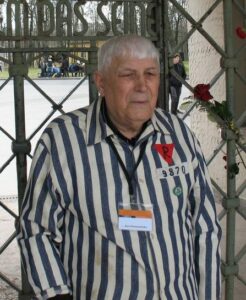 Borys Romanchenko (photo, left), 96, was a Holocaust victim who survived Buchenwald, Peenemünde, Dora, and Bergen-Belsen. He would have been 19 years old in April 1945, so it’s amazing he survived the camps.
Borys Romanchenko (photo, left), 96, was a Holocaust victim who survived Buchenwald, Peenemünde, Dora, and Bergen-Belsen. He would have been 19 years old in April 1945, so it’s amazing he survived the camps.
In recent years, was vice-president of the Buchenwald-Dora International Committee, and attended the 73rd anniversary of the camp’s liberation in 2018 (see story here).
CNN says, “The discovery of Buchenwald, on April 11, 1945, began the liberation of more than 21,000 prisoners from one of the largest Nazi concentration camps of World War II.
“The official US military account of the liberation called the camp ‘a symbol of the chill-blooded cruelty of the German Nazi state,’ where thousands of political prisoners were starved and ‘others were burned, beaten, hung and shot to death.'”
Wikipedia says, “A detachment of troops of the U.S. 9th Armored Infantry Battalion, from the 6th Armored Division, part of the U.S. Third Army, and under the command of Captain Frederic Keffer, arrived at Buchenwald on 11 April 1945 at 3:15 p.m. (now the permanent time of the clock at the entrance gate). The soldiers were given a hero’s welcome, with the emaciated survivors finding the strength to toss some liberators into the air in celebration.”
The late founder of this blog, Dr. Steve Schwartz, maintained his father, Dr. Robert Schwartz, was the first American to discover Buchenwald in April 1945, arriving there 3 days before Patton’s troops (see his posting here). This was a subject of a feud within his family, and there are dozens of postings on this blog about their fight over custody of Robert Schwartz’s Buchenwald photographs (see, e.g., posting here).
Steve showed me (and gave me a photocopy of) a letter his father wrote to his wife in April 1945 describing his discovery of Buchenwald. So I have more evidence than Steve’s word that his father was there on 8 April 1945.
The Schwartz family is Jewish. I remember sitting with Steve at his dining room table, in his Seattle home, a couple years before his death in March 2020 from Covid-19, and watching him break down and cry when he brought up the Holocaust in conversation. I think he would have cried for Borys, too.
CNN reports that Borys Romanchenko was killed by Russian shelling in the city of Kharkiv, Ukraine, on Friday, March 18, 2022. His granddaughter said he “was living in an apartment block … that was hit during a Russian attack.”
Putin has claimed the invasion was necessary to “de-Nazify” Ukraine. I doubt that Borys Romanchenko thought of him as a liberator.